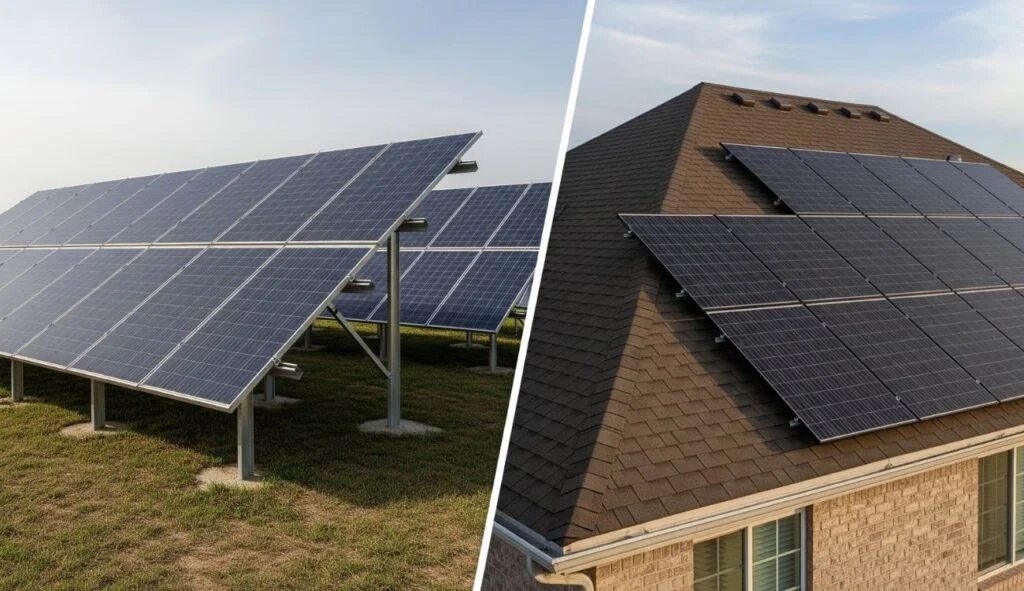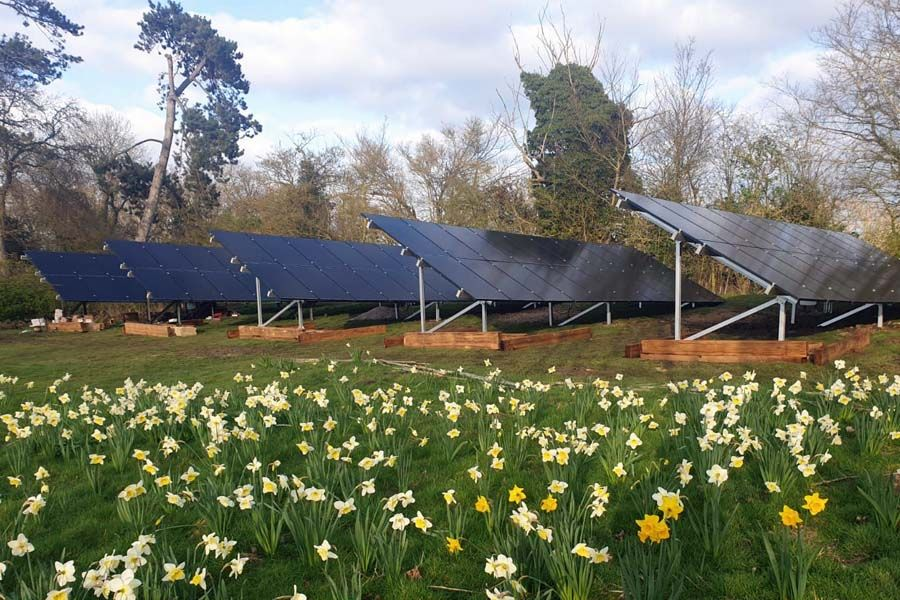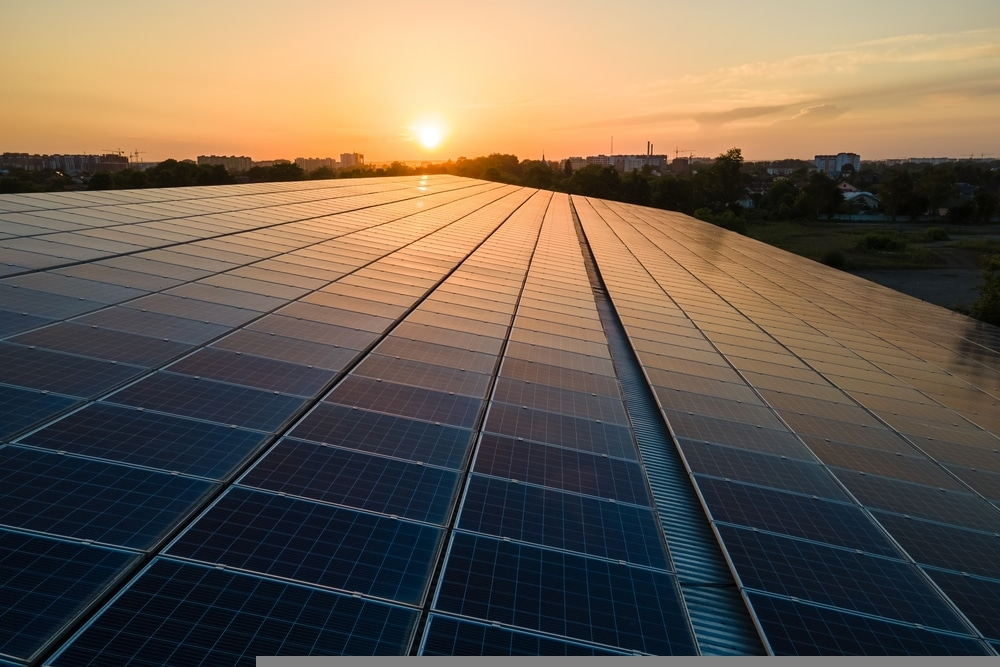
Is your roof really the best place for solar panels? For many Big Island homeowners, the answer isn’t always yes. While roof-mounted systems are common, not every roof has the space, angle, or sunlight needed for maximum output. That’s where ground-mounted solar comes in — giving you flexibility to install panels where they’ll perform best.
At BlueSky Energy Hawaii, we help families all across Hawai‘i weigh their options. Both roof and ground systems have unique benefits, and the right choice depends on your home, land, and energy goals. Let’s compare them so you can decide what works best for your property.
Ground-Mounted Solar: Flexible and Powerful
If your property has enough open land, ground-mounted solar can be a highly flexible and efficient option. Panels are installed on racks directly on the ground, and some systems even include trackers that follow the sun throughout the day to maximise energy production. This type of setup allows you to design a system that fully meets your energy needs while keeping your roof free for other purposes.

Pros of Ground-Mounted Solar
- Flexible placement: You can position panels at the optimal angle and direction to capture the most sunlight, regardless of your roof’s orientation.
- Bigger system potential: Ground-mounted systems aren’t limited by roof size, so you can add more panels to generate extra electricity, which is great for larger homes or those planning for EV chargers or battery storage.
- Easier maintenance: Cleaning and servicing panels is simpler since everything is at ground level, making upkeep safer and more convenient.
- Future-proofing: Perfect if you plan to expand your system later — adding panels, batteries, or other energy solutions is straightforward.
Cons of Ground-Mounted Solar
- Takes up space: Requires an open yard or plot of land, which may not suit all homeowners, especially on smaller lots.
- Higher upfront cost: Additional racking, foundations, and site preparation can make installation more expensive than roof-mounted systems.
- Permitting may be stricter: Ground-mounted installations in Hawai‘i sometimes require extra approvals or compliance checks.
- Aesthetics: Some homeowners may feel that panels in the yard disrupt the visual appeal of their property.
If you want to understand how going solar in Hawaii can cut your electricity costs, read our article: “Understanding Your Electricity Bill: How Solar Can Cut Your Costs in Hawaii”
Roof-Mounted Solar: The Classic Choice
Roof-mounted solar is the most common setup for Big Island homes, and for good reason. This option works well for families who want to take advantage of the sun without sacrificing their yard space. It’s a practical solution for urban lots, smaller properties, or homes where available land is limited. Roof-mounted panels also integrate neatly with the design of your home, giving your property a clean and modern look while generating energy efficiently.

Pros of Roof-Mounted Solar
- Saves valuable yard space: Panels sit on your roof, so you don’t have to give up garden, play, or parking areas. This makes it ideal for families with small lots or those who want to keep their outdoor space free for other uses.
- Lower upfront cost: Installation is usually more straightforward and less labour-intensive than ground-mounted systems, keeping your initial investment more affordable.
- Perfect for smaller properties: Roof-mounted solar works especially well when land is limited or when you want to avoid altering your yard.
- Aesthetically integrated: Panels follow the slope of your roof, giving a seamless, streamlined look that complements your home instead of standing out.
Cons of Roof-Mounted Solar
- Roof condition matters: If your roof is old, damaged, or needs replacement, those issues must be addressed before installation, which can add time and cost.
- Limited system size: The number of panels you can install depends on your roof’s size, pitch, and orientation, which can restrict the total power output.
- Shade challenges: Trees, poles, or nearby buildings can cast shadows that reduce performance and overall energy production.
- Harder maintenance access: Cleaning, repairs, or upgrades require ladders and careful handling, making maintenance more complex compared to ground-mounted systems.
Which is Best for Your Hawai‘i Home?
Whether you’re planning a solar setup for your Hawai‘i home or a commercial property, both roof-mounted and ground-mounted systems can be great options. When choosing the right system, it’s important to consider factors like your energy goals, monthly electricity usage, available roof or yard space, and your budget.
Going solar brings numerous benefits, from lowering your HELCO bills to supporting a cleaner, more sustainable future. The key is selecting the solution that best fits your property and energy needs. Here’s a simple way to decide:
Consider Roof-Mounted Solar If:
- You have a strong, sunny roof with limited yard space.
- You want a cost-effective, space-saving solution.
- You prefer panels that blend seamlessly with your home’s design.
Consider Ground-Mounted Solar If:
- You have plenty of open land to work with.
- You want flexibility to position panels at the ideal angle and direction.
- You plan to expand your system in the future (e.g., adding EV chargers or batteries).
Many Hawai‘i homeowners take a hybrid approach:
- Start with roof-mounted panels to cover immediate energy needs.
- Add ground-mounted panels later to boost output as energy demands grow.
This way, your solar system evolves with your lifestyle, giving you maximum savings and clean energy without compromising space or convenience.
Why Work With BlueSky Energy?
Choosing the right solar partner makes all the difference in Hawai‘i. At BlueSky Energy Hawaii, we understand the unique climate, permitting rules, and energy needs of local homes. Since 2014, we’ve designed and installed over 450 systems across the Big Island, helping families save more than $1 million annually on their electricity bills.
Homeowners rely on us because we offer no-pressure guidance, custom system designs for your roof or yard, in-depth Hawai‘i expertise, and ongoing support for monitoring and maintenance. Ready to see how solar can work for your home? Contact BlueSky Energy Hawaii today for a free consultation and start maximising your energy savings.
Closing Thoughts
In the end, choosing between ground-mounted and roof-mounted solar comes down to your property, energy goals, and budget. Roof-mounted systems are cost-effective and space-saving, while ground-mounted panels offer flexibility and larger system potential for those with available land.
At BlueSky Energy Hawaii, we help Hawaii homeowners weigh these options and design a solar system that fits their needs perfectly. Whether on your roof, in your yard, or a combination of both, we ensure your system delivers maximum savings and efficiency.
FAQs
What’s the difference between ground-mounted and roof-mounted solar panels?
Roof-mounted panels are installed directly on your home’s roof, making them ideal if you have limited yard space. Ground-mounted panels are installed on racks on open land, giving you more flexibility in positioning and system size. The choice depends on your property layout, energy goals, and budget.
Which option is more cost-effective for Hawaii homes?
Generally, roof-mounted systems have a lower upfront cost because installation is simpler and requires less site preparation. Ground-mounted systems cost more due to additional racking, labour, and sometimes stricter permitting requirements. However, if you want a larger system or more expansion room, the extra cost of ground-mounted panels can be worthwhile.
Can I install solar if my roof isn’t ideal?
Yes! If your roof is shaded, angled poorly, or doesn’t have enough space, ground-mounted panels can be a better solution.
Which system produces more energy?
Ground-mounted panels can often produce more energy because they can be positioned at the ideal tilt and orientation without being limited by the roof. Roof-mounted panels can still generate significant power, especially on sunny Hawaiian rooftops with minimal shade.
Are there maintenance differences between roof and ground systems?
Yes. Ground-mounted systems are easier to access for cleaning, repairs, or upgrades. Roof-mounted panels are harder to reach, which can make solar maintenance slightly more challenging and require professional assistance.




Recent Comments